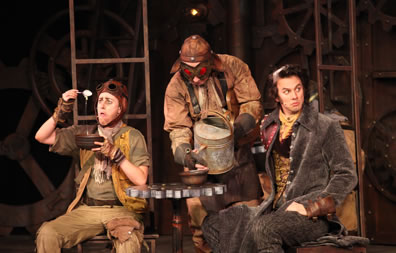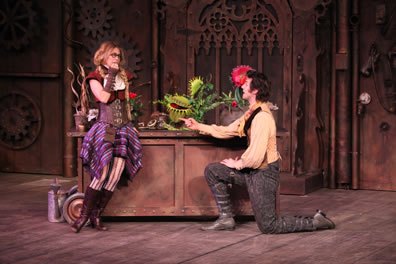The Comedy of Errors
Steampunk Creates Otherworldly Errors
Bard on the Beach, BMO Mainstage, Vancouver, British Columbia
Saturday, August 15, 2015, Section 4, B–42 & 43 (front, center right section)
Directed by Scott Bellis

Dromio of Syracuse (Luisa Jojic, left) and Antipholus of Syracuse (Ben Elliott, right) are served slime in an Ephesian cafe by Andrew Cownden in Bard on the Beach's steampunk production of William Shakespeare's The Comedy of Errors. Below, Antipholus of Syracuse courts Luciana (Lindsey Angell) as a carnivorous plant stands by. Photos by David Blue, Bard on the Beach
Characters wearing gas masks, goggles, Victorian lingerie, and bionic appendages. A set that looks like a giant machine. Music that sounds like Yanni inside Big Ben. And a script that is pure Shakespeare. This is Scott Bellis's steampunk production of The Comedy of Errors for Vancouver's Bard on the Beach, and it is one of the most bizarre yet brilliant Shakespeare productions I've ever seen.
Quoting from www.urbandictionary.com: "Steampunk is a subgenre of speculative fiction, usually set in an anachronistic Victorian or quasi-Victorian alternate history setting. It could be described by the slogan 'What the past would look like if the future had happened sooner.' It includes fiction with science fiction, fantasy or horror themes."
Think H.G. Wells and Jules Verne, a 19th century view of the future. Manifestations in entertainment are the television show and movie The Wild, Wild West, The League of Extraordinary Gentlemen graphic novels and film, and, to some degree, Doctor Who. The concept has its own fashion, mingling Victorian dress with erotica for the women and uniforms with mechanical accents for the men. It also has its own music, a blending of New Age Muzak and boogie saturated with mechanical and electronic sounds.
Steampunk has generated a cult following, and at the performance of The Comedy of Errors we attended, a couple in the audience was dressed in steampunk gear, earning a gestured acknowledgement from Doctor Pinch. He, by the way, wears a long black cloak, top hat, a boar-shaped visor, and gas mask, and has bionic claws for one hand. His is the most far-out of Mara Gottler's costume designs, but the rest of the cast resemble a mishmash of Mad Max industrial clothes, Old West saloon fashions, and Edwardian uniforms, with goggles as an essential accessory. Pam Johnson's set is a metal wall comprising huge gears, tubes, valves, strings of lights, a giant clock, and a wooden church door that turns into a metal gate for the rectory. Odd-shaped furniture features cogs and strange gadgetry, and pistols look like metal Nerf Ball blasters. One scene takes place in a kitchen in which a squid-like creature tries to escape a copper pot of boiling water. Another scene takes place in a greenhouse with a carnivorous, cactus-like plant. The Syracusan twins eat slime at the Ephesian cafe—and find it quite tasty.
It's all very weird. However, the steampunk setting allows Bellis to maintain fealty to the text without worrying about modern sensibilities or plot logic. This is a fantasy world of contraptions, cyborgs, archetypes, and quasi-humans, and the setting having already suspended our belief, we have no bearings with which to question Shakespeare's improbable plot device of two sets of twins, one servant to the other, split apart in childhood, and now as adults happening to alight in Ephesus unbeknownst to each other, causing massive confusion in the city.
I say that Bellis maintains fealty to the text, but he does add a few steampunk conventions to the story. Before the play opens, a hooded actor in dirty coveralls and an apron comes on stage carrying a toolbox and begins inspecting and fiddling with the various mechanics on that backdrop. As the mechanized music builds, the full cast emerges, stepping back and forth, forward and backward across the stage in stiff movements. You might notice in this marching tableaux that the two sets of twins end up side by side at times—yet they never look at each other. In the cast list, Doctor Pinch (Jeff Gladstone) is not a schoolmaster and exorcist but is a cyborg and mad scientist, and he seems to be stage managing these pageants at the start of the play and following intermission (and maybe he's stage managing the whole sequence of events in the play, too).
Luce, who participates in the scene in which Dromio of Syracuse shuts Dromio and Antipholus of Ephesus out of their own home, is here turned into Maud, a chambermaid to Adriana and played by Daniel Doheny with ever-puckered lips and walking in short, tip-toe steps. She gets plenty of stage time, though no lines outside the gate scene. Also a regular on stage is Nell, the spherical cook engaged to Dromio of Ephesus (and thus mistakenly laying claim to Dromio of Syracuse). Played by Andrew McNee, she is almost zombie-like, displaying superhuman strength and vocalizing like a pterodactyl in distress.
The Comedy of Errors is set inside the dramatic framework of old Egeon, a merchant of Syracuse and father of the two Antipholi, facing execution at the end of the day for landing in Ephesus against a law arising out of a conflict between the two city states (Antipholus and Dromio of Syracuse learn of this law, too, and try to lay low, but, of course, everybody recognizes them as the Ephesian Antipholus and Dromio). In the opening scene as Egeon (Bellis) tells the Duke of Ephesus (Gladstone) his history, how the shipwreck split the family and how his son and servant, upon reaching adult age, set out to search for their brothers, other actors on stage provide aural and visual mood effects. After describing the shipwreck, Bellis shouts for his wife, "Emilia!" and though this is not textual it echoes in our imagination when she appears in the play's final scene.
Aside from such suitable interpolations and some minor trims, this Comedy of Errors is text-centric, and the actors on the whole perform Shakespeare's script with both expert verse-speaking skills and perfect comic timing. Dromio of Syracuse (Luisa Jojic) is given the full catalog of jokes trying to describe "a police officer" first to Adriana (Sereana Malani) and then to his master. Many productions cut this series of archaic and obtuse references that would have been hilarious to the law students at a Grays Inn Christmas party who saw this play in 1594 (Shakespeare may have written Comedy of Errors for that occasion), yet Jojic makes the whole sequence funny to this 2015 audience.
An exemplary scene is Antipholus of Syracuse (Ben Elliott) courting Luciana (Lindsey Angell), the sister to Adriana who is the wife of Antipholus of Ephesus. Antipholus of Syracuse knows he's not married to Adriana while Luciana is certain he is; so Elliott making poetic love to Luciana is beautiful in tone while Angell's consternation at Antipholus's seeming cheekiness while appreciating his romantic overture is comical in circumstance. Antipholus may be dressed in western-style pants, blousy shirt, and gold-velvet vest, and the pig-tailed Luciana has on a leather corset and hitched-up purple plaid dress showing legs in exotic stockings and calf-high boots—and all the while the carnivorous cactus thingy is cavorting on the countertop between them—but the comical yet soulful conversation still holds our attention. Such is the power of talented actors playing Shakespeare's clever script. At the end of this conversation, Angell's Luciana appears to give in to Antipholus before she innocently suggests that she "Fetch my sister, to get her good will." "OK?" she adds, and off she goes expectantly.
And then Nell comes on and feeds the plant one of her fingers. No worries; her finger quickly grows back.
I've seen the gate scene staged with imaginary doors, I've seen it played on two levels with Dromio above and the Ephesian twins on the street below, and I've seen it played with a door set perpendicular to the audience. Here, the steampunk set allows for an inventive manner of acting out this scene. Dromio of Ephesus steps up to the door at the back of the stage just as it is being detached from the rest of the wall and, now on a rolling platform pushed by two actors in industrial work clothes, turns so that we discover Dromio of Syracuse on the other side. The workers move the door platform across the stage, turning it according to who is speaking as the rest of the scene plays out (Bard on the Beach's BMO Mainstage theater is a Guthrie-style thrust, with seven sections of arena seating on three sides of the stage). The episode ends with Antipholus of Ephesus (Jay Hindle) ordering his Dromio (Dawn Petten) to fetch a crow (meaning crowbar) to break in the door. Dromio, riffing on his Syracusan counterpart's statement that he will let them in "when fowls have no feathers and fish have no fin," thinks his master means a bird. "A crow without a feather? Master mean you so?" And suddenly, Petten starts rapping as Hindle's Antipholus provides the beat box: "For a fish without a fin, there's a fowl without a feather, if a crow help us in, sirrah, we'll pluck a crow together."
 Such inventions catch us by surprise, as much as does a squid knocking off a pot's lid, as much as does the Courtesan (Lili Beaudoin) showing up in black leather shorts with wings and Lucifer horns, as much as does Dromio of Ephesus arriving to give his master a rope when he (and we) are expecting him (actually Dromio of Syracuse) to give his master money. Whether in staging or via Shakespeare's script, we are knocked about like a pinball bouncing off one comic bumper after another. Even so, our hearts are genuinely moved as the Abbess (Anna Galvin)—after she is rolled on stage as a supersized nun on a pedestal—triggers the climactic discoveries that end the play with happy reunions.
Such inventions catch us by surprise, as much as does a squid knocking off a pot's lid, as much as does the Courtesan (Lili Beaudoin) showing up in black leather shorts with wings and Lucifer horns, as much as does Dromio of Ephesus arriving to give his master a rope when he (and we) are expecting him (actually Dromio of Syracuse) to give his master money. Whether in staging or via Shakespeare's script, we are knocked about like a pinball bouncing off one comic bumper after another. Even so, our hearts are genuinely moved as the Abbess (Anna Galvin)—after she is rolled on stage as a supersized nun on a pedestal—triggers the climactic discoveries that end the play with happy reunions.
While this Comedy of Errors features an exceptional cast, the actors' collective talents are better appreciated in juxtaposition to the other show this company is doing in repertoire this season: the Prohibition Era, speakeasy-set Love's Labour's Lost. The classy Rosaline (Jojic) and the flapper Jacquenetta (Petten) in that play become the two Dromios who, in old-style leather flight caps, look identical (and nothing like their Love's Labour's Lost roles). The charming Ferdinand (Hindle) and the intellectual piano-playing Holofernes (Elliott) of Navarre become the two Antipholi of Ephesus and Syracuse, with shocks of gray hair whisping through their pompadours (they, too, look identical, except that their gray streaks and red shoulder plates are on opposite sides). Moth the boy (Beaudoin) in Love's Labour's Lost becomes the devil of a courtesan in The Comedy of Errors, while Andrew McNee, the Italian swain Don Armato, is unrecognizable as the quasi-human, unearthly screeching Nell.
In more ways than one, you are stepping into an alternate reality created by both Shakespeare and Bellis. From one brilliant practitioner through another, this steampunk Comedy of Errors delivers surprises, dramatic confusion, heart-tugging moments, and infinite laughter.
Eric Minton
September 10, 2015
Comment: e-mail editorial@shakespeareances.com
Start a discussion in the Bardroom



 Find additional Shakespeareances
Find additional Shakespeareances